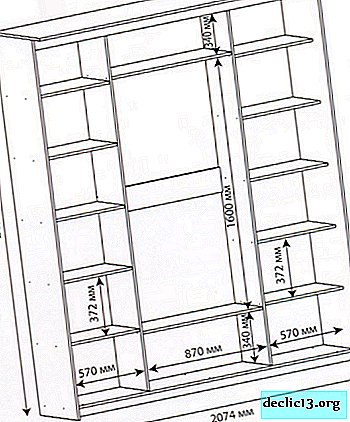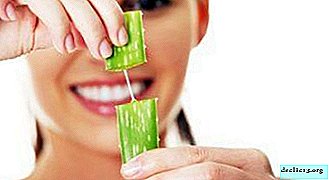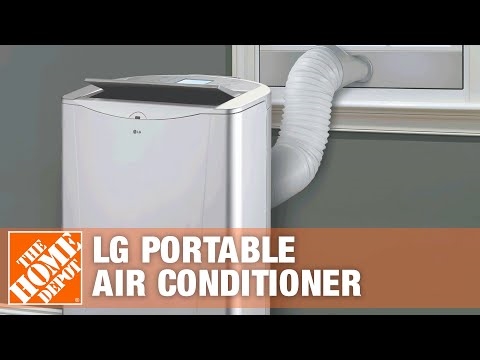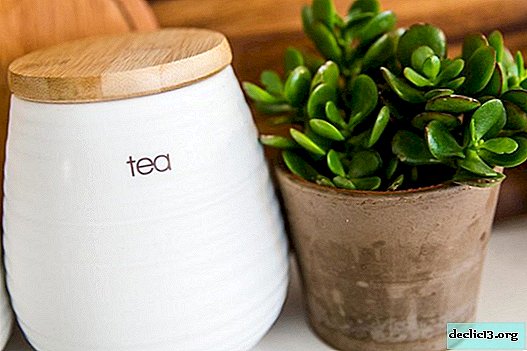How to clean the oven of old fat and carbon deposits

Many women love to cook, but the most difficult part starts after a cooking show. A mountain of unwashed utensils, dirty kitchen utensils. It is simple to cope with the dishes, but it can take a lot of time to search for a tool that will help clean the oven of old fat and soot.
To alleviate the fate and cleanse the dirt quickly and effectively at home, an ordinary wet rag is enough if you use it immediately after cooking. While the fat is not stagnant on the walls of the cabinet, it can be removed with ease.
What if there is no desire or ability to clean the surface of the oven every time? Chemical agents or alternative methods such as soda, salt, citric acid and other household substances will help.
The easiest way is to purchase a self-cleaning stove. The device is equipped with special technologies that cleanse fat and soot during cooking or do not allow fat to linger on the surface. This method saves time, but does not save the contents of the wallet.
Safety precautions
Take care not to get burns or other injuries.
- Wear gloves and goggles during the procedure. This will protect against accidental splashes of detergent.
- Disconnect the stove completely.
- Do not wash the heating elements of the oven.
- Be careful not to inhale the fumes of the detergent.
- Ventilate the room.
Chemicals against soot and fat

According to the results of the housewives surveyed, they prefer to use the following products to clean the oven.
- Amway. Belgian gel for cleaning ovens, pots, stoves and range hoods. One of the most popular and effective means. It removes even old fat, but consists of aggressive elements, so it can cause problems if it gets on the skin.
- Shumanit. Detergent from Belgium with the advantages and disadvantages of the previous tool. Can wash the glass door of the oven. Use with extreme caution!
- Sanitar. Gel made in Russia, suitable for washing plates. It cleans contaminants well, but quickly dissolves after application.
- Sif anti-fat. Hungarian engineering, combines efficiency and low price. Pungent odor and aggressive effect on the skin.
- Unicum gold. Active foam for cleaning ovens, stoves, pots and pans. Country of production - Russia. It is undesirable to apply on painted and aluminum surfaces.
- Reinex. The German spray is the last on the list. Effective, but can not cope with serious pollution and old fat. Contains substances that can be harmful to health if it comes into contact with the skin.
Other chemicals for cleaning stoves and ovens are also for sale, but the listed ones are the most popular because of their effectiveness. Before buying, read the reviews for each product and choose the most suitable.
Folk remedies and recipes against fat and carbon deposits

With fat and soot can cope with substances that are likely to be found in everyday life.
- With little effort, you can even get rid of old dirt using an abrasive washcloth.
- Laundry soap. An excellent environmental product that contains alkaline components. The composition helps in the fight against stagnant fat, even in the microwave. Dip a piece of soap in a bowl of water and heat in the oven to 150 degrees. The fat will begin to soften after 45 minutes, and will easily be washed off. Then wash the surface with water and ventilate to leave a soap odor.
- Water vapor. If the oven requires delicate cleaning, draw a bowl of water and drip a few drops of detergent. Heat the appliance to 150 degrees and place the bowl for half an hour. Grease is easily wiped off with a damp cloth.
- Baking soda. Soda will wash the glass door. Wipe it with a wet sponge or rag. Then pour more soda on top and leave for an hour, having previously grinded on glass. After an hour, wipe the glass with a wet sponge until we remove the remaining soda, and wipe it dry. You can additionally wipe the glass with a mirror cleaner.
- Ammonia. Use preferably at night. Let's consider two options.
- Lubricate the walls of the oven with ammonia and leave until morning. Rinse thoroughly with water afterwards.
- Dial a bowl of boiling water and a bowl of ammonia. Put water down, and ammonia up. Leave for several hours, then rinse with water.
- Soda and salt. It helps not only against dirt, but also against smell, even in the refrigerator. Stir in equal proportions, and grate the walls, then heat the oven. Leave the mixture until morning. The grease is stratified and washed off easily with a damp cloth.
- Baking powder for the dough. Moisten the oven walls with a damp cloth. Sprinkle with baking powder and wait a few hours. Fat will gather in lumps that are easy to remove with a sponge.
Advantages and disadvantages of folk remedies
| pros | Minuses |
|---|---|
| Means are always at hand | It is necessary to pre-mix the components in the correct proportions |
| Help no worse than chemical products | Leave the substance to insist on the walls of the oven for up to a day |
Features of cleaning electric ovens

For an electric stove, prepare a paste of detergents. For manufacturing you will need:
- Lemon acid.
- Comets or pemolux - any powder for cleaning the kitchen.
- Balm for dishes.
Mix the ingredients, taking an equal amount. Spread the pasta and wait about an hour. It will remain to wash off the chemical with water. Wash thoroughly so that there is no chemistry left in the stove. Wipe the oven dry.
Get rid of the unpleasant odor left by the paste as follows.
- Daytime airing of the oven.
- Put the bowl of water and activated charcoal in the oven for half an hour.
- Wipe the walls with lemon juice.
- Change the water during cleaning with detergent.
Following the proposed steps, easily clean the electric stove from dirt and you can deal with the consequences.
Chemical cleaning process
- Prepare materials and take care of safety.
- Remove the baking sheets and excess that lies in the appliance.
- Clean the baking sheets first. Using a detergent, wipe them with a brush.
- Go to the oven. Warm it up and turn it off.
- Rinse the walls and trays with water. There should be no detergent left. Use more water!
- Wipe with a dry cloth or sponge.
Advantages and disadvantages of household chemicals
Pros:
- Cleaning is much faster.
- Dirt is removed more efficiently.
- No need to mix and prepare anything. The manufacturer has already prepared everything.
Minuses:
- Danger of getting a chemical burn or allergic reaction.
- It is highly likely that part of the product will remain on the surface.
| pros | Minuses |
|---|---|
| Cleaning is much faster. | Danger of getting a chemical burn or allergic reaction |
| Dirt is removed more efficiently. | It is highly likely that part of the product will remain on the surface |
| No need to mix and prepare anything. The manufacturer has already prepared everything |
How to use the self-cleaning function in the oven

Many plates have mechanisms for self-cleaning the surface. Such models are more expensive than conventional ovens. However, it is much more convenient than regularly cleaning manually.
Easy cleaning technology
The simplest system to integrate into most models. The principle is to coat the walls with a special enamel that is resistant to contamination. To activate cleaning, pour water into the hole in the stove with the addition of detergent, which is sold in stores. Heat the oven to one hundred degrees for half an hour. After cooling, wipe with a dry cloth.
Catalytic cleaning
It is installed in some models and is not so widespread. The principle is as follows: the oven cleans itself on its own when it reaches 140 degrees. There are several nuances.
- The coating has an expiration date and needs to be changed.
- Baking trays and wire racks must be cleaned manually.
- Sour-milk products reduce the effectiveness of cleaning.
Pyrolytic cleaning
The most effective result: after pressing the start button, the oven heats up to 500 degrees and completely burns fats, dirt and other food debris. However, at these temperatures, electricity costs will increase and a ventilation system or hood will be required to remove odors after cleaning.
Eco-friendly cleaning system
An effective but expensive system. A limited number of manufacturers supply such equipment. It consists in the ecological elimination of fats and odors when reaching 270 degrees. Self-healing balls, which are built into the oven and dissolve impurities, help in this.
Each system has its own drawbacks. Price, quality, load on the power grid - choose based on those that you are ready to put up with during use.
Useful Tips
- After each cooking, it is advisable to go through the oven with a damp cloth to remove fresh fat. Later, they are more difficult to clean.
- Clean not only the inside of the oven, but also the glass on the door.
- Use acid-free cleaners. Acid can damage the surface.
- When using chemical detergents, rinse the oven with water more than three times. Only after this do traces of chemistry that can get into food disappear.
- Folk methods do not leave marks and are harmless to food.
- Use rubber gloves to protect your skin.
- Self-cleaning ovens are easier to use, but significantly more expensive than conventional ones.
- A dense fat layer is easier to clean with a coarse brush.
- If you warm the oven to 40 degrees, dirt and grease easier to move away from the walls.
- During cleaning, open the doors and windows for ventilation, and unplug the oven from the outlet. Especially if you use ammonia!
- If you heat the oven with cleaning agent, do not open the door during the procedure. You can get burns! Wait until the appliance cools down.
If you do not want to spend time on regular cleaning of equipment, self-cleaning plates are an excellent option. I hope that each reader will choose the most suitable way to remove contaminants.

















